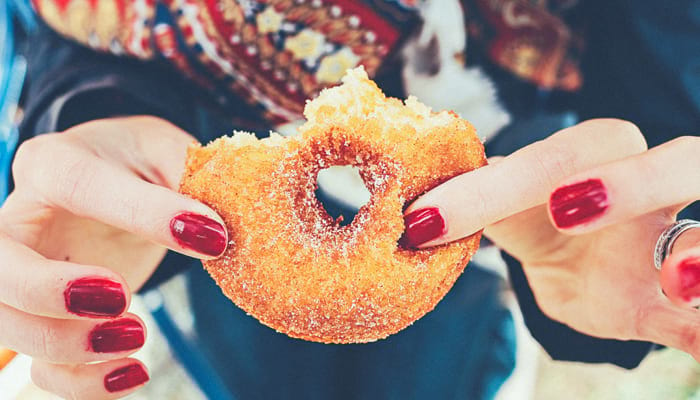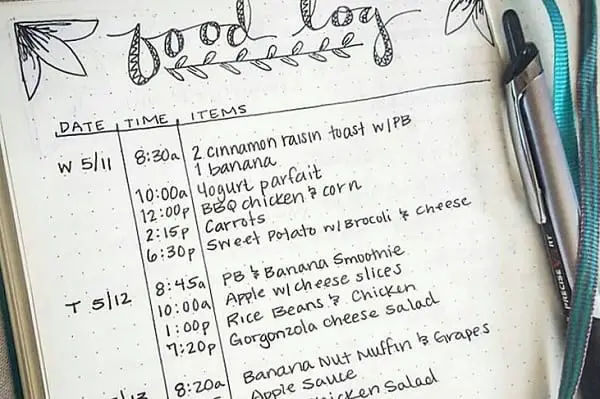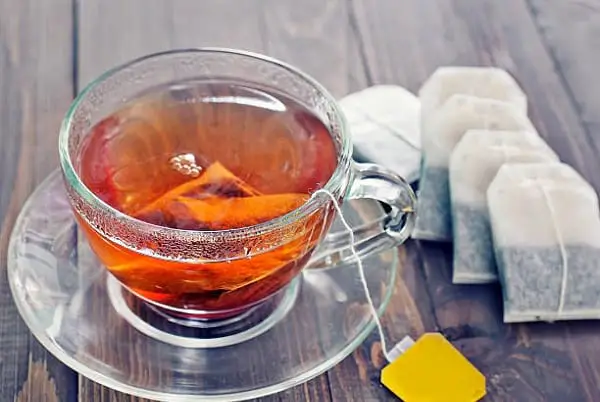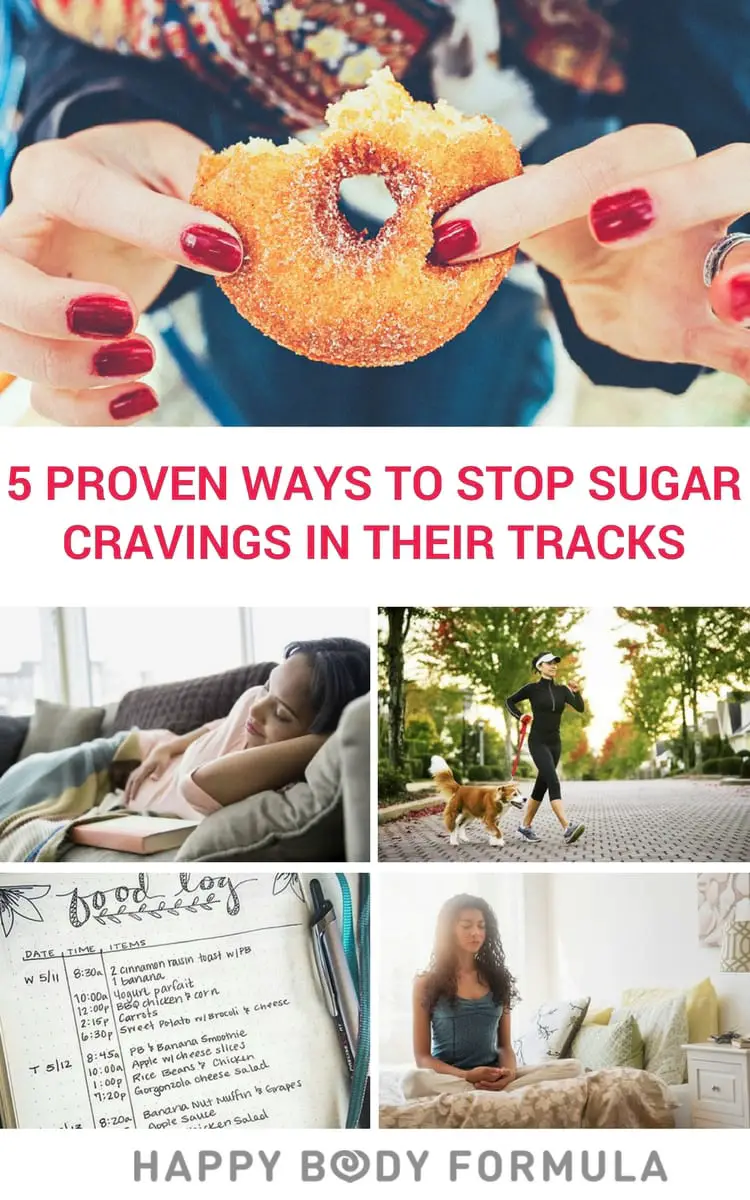Medically review by Kim Langdon

For some folks, sugar cravings are the major hurdle standing between them and living a consistently healthy lifestyle.
There are a few sneaky ways those cravings crop up.
We're tempted at breakfast when we stop at the cafe and we're not quite awake yet, or cravings rear their ugly head in the afternoon when the need for a jolt is strong.
Some people have no problem sticking to healthy foods all day until around 8 p.m.
You know - when the work is done, dinner has been served, the chores have been finished, and we're on the couch ready to unwind... with some snacks.
In any of these scenarios, sugar stands in to give us a little hug. It reminds us that everything is okay, and it simultaneously provides us with energy.
Our bodies know this, and that's why it communicates to the brain to ask for it in the first place. You're not crazy. In fact, you're totally normal.
That doesn't mean you like the sugar cravings or actually need that additional energy, though.
Sometimes, it's okay to give in to a stray craving and use food for something besides actual hunger.
Most of the time, though, we really want to work hard at staying on track and save those indulgences for a time when we really want our favorite holiday cake or a treat from the best bakery all the way across town - special occasions!
When it comes to the day-to-day, we need to be armed with smart strategies to stop sugar cravings in their tracks.
Anyone who has a tricky relationship with sugar knows that the compulsion to eat sweets can be surprisingly strong and unrelenting, but there are a few simple ways to curb that craving and address its root cause.
1. Exercise

Boosting serotonin can really bust sugar cravings.
This neurotransmitter is a natural mood stabilizer, so getting that quick release will definitely help you to fight the cravings when they're emotionally driven.
Boosting serotonin will help to combat both depression and anxiety, helping you ward off those down feelings and rapid-cycling thoughts that often lead us straight to the cookie jar for a little self-soothing.
Exercise is an easy way to give the brain a little something to work with. Research shows that exercise is linked to higher serotonin levels.
It doesn't have to be a tough or long workout.
Simply going for a walk or jogging enough to get your heart rate up should do the trick. Try to give yourself 15-20 minutes for the best results.
Plus, this will give you enough time to maybe even forget about your sugar cravings altogether.
This method combines both chemical release and distraction techniques for good results, tackling the issue from the root.
2. Take a nap

Fatigue is a very powerful force in our cravings because it messes with our hormones.
Appetite regulation is controlled by digestive hormones like ghrelin, leptin, and cholecystokinin.
Ghrelin signals hunger, while leptin tells us when we're full. When we're not getting enough sleep, studies show that leptin levels can drop by up to 18% and ghrelin can spike up to 30% - those numbers are huge!
Many people who experience regular cravings can link them back to strong feelings of fatigue.
These hormone imbalances are linked to increased hunger - particularly for carbohydrate-rich foods.
A simple nap won't fix the fluctuation hormones if you're chronically sleep-deprived. In that case, it's good to reset your sleeping habits and make getting those 7-8 hours a priority.
This could be the key to saying goodbye to cravings for good. For a quick fix and easy distraction, 15-20 minutes will do your brain and body good.
If you have the freedom to do so, this can be the key to getting through the afternoon slump.
If your cravings tend to hit hard as soon as you make your way home from work, take a snooze before you tend to the house, cooking, and all your other responsibilities.
3. Meditate

Is there anything meditation can't address?
If you keep your practice consistent, not really. It provides some space in the day - space to just be, and not to think about anything at all.
Just 10-15 minutes spent sorting your thoughts, letting them pass by, and tending to your brain can be just as rejuvenating as a nap, and just as effective for stress relief as a serotonin boost from exercise.
It can be really simple, and if you can fit scrolling on Facebook into your day, you can definitely squeeze in a meditation session.
I recommend using the app Headspace.
In one study done with subjects who suffer from binge eating disorder, meditation decreased binge frequency from around 4 times per week to 1.5 instances which is a massive drop!
It also showed an increase in the perceived sense of control, which we know is a major component of cravings and giving into them.
This indicates that meditation can be therapeutic on a larger scale, so using it as an intervention for sugar cravings - and developing a consistent schedule to treat the root of comfort eating or emotional eating - can be incredibly helpful.
Read more about the amazing benefits of meditation.
4. Log your food

Individuals who keep a food journal stick to good eating habits more often and lose more weight. A little accountability goes a long way.
There are two reasons why this intervention technique works for random cravings. First, you can log what you are about to eat now.
It's on paper or entered into your phone, so you can check out how it stacks up to the rest of your day.
Chances are, it will at least make you think twice. If not, now you've at least come to terms with whatever your craving might be, and you have something to look back on when it hits again.
Think about tracking your mood, fatigue levels, and anything else that might be driving the craving in your journal.
Alternatively, try logging the snack you are allowing yourself to have, and using it as a tool to set a limit for yourself.
Some people have no trouble stopping at a specified amount of a sugary snack and can fit it into their day seamlessly, but others face big triggers with food without brakes.
If you use a food journal to practice portion control instead of abstinence, this tactic could still help you implement some damage control.
5. Drink something

You've likely heard some statistics about how often we confuse our thirst with hunger, but hey - it's true.
Think about how much water you've consumed throughout the day already and take into account any diuretics that could be furthering dehydration.
If you've already had balanced meals and know your body isn't actually hungry, a tall glass of water or a warm mug of tea could help you move past those cravings swiftly and painlessly.
Fluids will help fill up the stomach and make you feel fuller, addressing any physical hunger that might be present temporarily.
If your body was truly only thirsty, you might see an immediate drop in those craving levels.
Otherwise, the need for something sweet can be soothed by a hot cup of tea.
Try herbal blends with your favorite fruits and herbs, and add some honey, stevia, or almond milk for a relaxing beverage that you can savor.
By the time you're finished with your tea, you can reassess whether or not you still want that snack.
As always, good luck to you on your journey! We hope you found a new strategy here today that works for you when you need it the most.
Kick those sugar cravings to the curb, and indulge wisely when you do.
This article was fact checked for accuracy by Dr. Kim Langdon, MD. As always, this is not personal medical advice and we recommend that you talk with your doctor.
Share on Pinterest

chulte E, Avena N, Gearhardt A. Which foods may be addictive? The roles of processing, fat content, and glycemic load. PLoS One. 2015;10:e0117959. doi: 10.1371/journal.pone.0117959.
Gearhardt A, Roberts M, Ashe M. If sugar is addictive…what does it mean for the law? J Law Med Ethics. 2013;41(Suppl 1):46–49. doi: 10.1111/jlme.12038.
Avena NM, Rada P, Hoebel BG. Evidence for sugar addiction: behavioral and neurochemical effects of intermittent, excessive sugar intake.
Fuchs RA, Tran-Nguyen LTL, Specio SE, et al. Predictive validity of the extinction/reinstatement model of drug craving. Psychopharmacology. 1998;135:151–160. doi: 10.1007/s002130050496.
Kimberly Langdon M.D. is a retired University-trained obstetrician/gynecologist with 19-years of clinical experience. She delivered over 2000 babies to mothers in a suburban Midwestern community.

